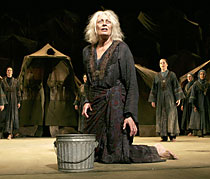With her starring role in the Royal Shakespeare
Company’s "Hecuba," Vanessa Redgrave began her debut
at the Brooklyn Academy of Music on June 17. One can only regret
that it took her so long to get to Brooklyn.
Redgrave’s performance is powerful, nuanced, textured, passionate
and reasoned. The Tony and Academy Award-winning actress’ wild,
white mane, anguished face and expressive hands all make the
tragedy of this tortured mother and fallen queen as personal
as the death of a neighbor’s son and as contemporary as an article
in today’s newspapers. The relevancy for us as a modern audience
given current events is, of course, exactly what poet-translator
(and now director, after he took over the reins from Laurence
Boswell) Tony Harrison had in mind when he translated Euripides’
2,500-year-old tragedy.
But Redgrave is not all fury. Her performance has a perfectly
lucid quality. After all, Hecuba is only seeking justice – nothing
more and nothing less. She is even capable of irony when she
chides Odysseus that he is not listening to her. And there is
more than a bit of cunning in the way she eventually plots her
revenge.
Set in the aftermath of the Trojan War, "Hecuba" uses
the story of the Trojan queen, now a slave of the Greeks, to
portray the senseless brutality men are capable of enacting against
one another.
First Hecuba loses her daughter, Polyxena, to the ghost of Achilles
(who demands she be sacrificed). Then she discovers she has lost
her son, Polydoros, to Polymestor, the King of Thrace. (The King
of Thrace kills the young Polydoros, whom Hecuba entrusts him
with, in order to rob him of his gold).
Bitter and betrayed, Hecuba seeks vengeance where she can. After
receiving assurances that he will not intervene from Agamemnon,
king of Mycenae, she blinds Polymestor and kills his two sons.
Harrison says he decided to write a new version of "Hecuba"
for the Royal Shakespeare Company because he knew Redgrave had
agreed to play the title role. But one suspects the current situation
in Iraq had more than a little to do with his decision.
The allusions are all over the place. The Greeks have formed
a "coalition." Hecuba insists that "those in power
shouldn’t use it to do wrong" and asks whether "democracy
demands a human sacrifice." The King of Thrace laments that
he has been destroyed by "terrorists from Troy."
Fortunately, however, this production does not need to be propped
up by political innuendo. From Es Devlin’s set of tiered tents
to Adam Silverman’s moving manipulation of light and shadow to
the chorus (which sings its grief and horror) to Redgrave’s supporting
cast, Harrison’s "Hecuba" is uniformly outstanding.
Lydia Leonard as Polyxena is a dignified, noble and virtuous
martyr who is a powerful illustration of what the messenger,
Talthybius (Alan Dobie), means when he says to Hecuba, "You’ve
got the best of children and the worst of fate."
Darrell D’Silva makes Polymestor tragic as well as evil in his
blind rage at the loss of his sight and his children. In fact,
in portraying Polymestor as a kind of distorted mirror image
of Hecuba, D’Silva provides the link that makes "Hecuba"
so chillingly effective.
When Euripides wrote "Hecuba," he was addressing an
audience of victors and reminding them that victory is not always
sweet, and it is certainly not without guilt. No doubt this was
not a lesson everyone was ready to hear.
Today, Redgrave and Harrison are attempting to revive this message
for a nation that has not yet even tasted victory. It is a lesson
that will be even harder for ambivalent and confused Americans.
Still, Euripides’ wonderful poetry and Harrison’s sensitive translation,
coupled with this extraordinary presentation, make The Royal
Shakespeare Company’s "Hecuba" a must for anyone who,
like this reviewer, believes that just about everything we need
to know about morality (if not in the Bible) was elucidated by
the Greeks.
The Royal Shakespeare Company’s production
of "Hecuba" plays June 25 at 2 pm and 7:30 pm, and
June 26 at 3 pm, at the BAM Howard Gilman Opera House (30 Lafayette
Ave. at Ashland Place in Fort Greene). Tickets are $30, $45,
$65 and $85. For tickets and information call BAM Ticket Services
at (718) 636-4100 or visit the Web site at www.bam.org.

























